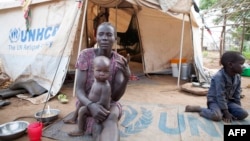The United States, United Kingdom and Norway said Monday that South Sudanese President Salva Kiir reneged on a promise when he failed to show up for the latest round of peace talks for his country.
In a statement read out at the talks in Addis Ababa by British special envoy Matt Cannell, the three countries, which make up the troika for South Sudan, say that Mr. Kiir and other South Sudanese leaders "agreed to return to Addis on February 20 to for a final round of negotiations." It notes "with deep concern and regret that President Kiir has not honored that commitment."
When the warring parties last met at the end of January, Mr. Kiir and his main rival in the South Sudan conflict, former vice president Riek Machar, signed a power-sharing proposal for a transitional government. The proposal was put forward by the regional Intergovernmental Authority on Development (IGAD), which has been trying to broker peace in South Sudan for nearly 14 months. IGAD gave the warring factions in South Sudan until March 5 to hammer out a final peace deal.
Last chance talks
It was not immediately clear why Mr. Kiir was not in Addis Ababa for the latest round of talks, which IGAD's lead mediator, Seyoum Mesfin, has called the final opportunity for South Sudan.
“After months of negotiations, you are all well aware of what must be achieved now. Genuine compromise and dialogue must take place," Seyoum said. "The agreed March 5 deadline to conclude negotiations must be respected..."
The troika echoed Seyoum's call for compromise, saying South Sudan’s leaders need to set aside their personal ambitions and reach a mutual understanding on key issues, including the make-up of a future transitional government.
The troika called on the U.N. Security Council to consider a resolution on South Sudan that includes the possibility of sanctions, and pointed the finger of blame for the conflict at all of South Sudan’s leaders.
The statement read by Cannell notes that two million South Sudanese have fled their homes and are living as refugees in neighboring countries or as internally displaced persons inside South Sudan. Millions face food shortages, and the country is on the brink of an economic crisis caused by the conflict, the statement says.
Human rights report
The troika's statement calls for a report by an African Union (A.U.) commission of inquiry into human rights abuses committed during the 14-month-old conflict in South Sudan to be made public. The report was supposed to be published last month at an A.U. summit, but was delayed at the last minute. The troika said that publishing the commission's report would help to ensure that "violence against civilians cannot be undertaken with impunity."
Former Nigerian president Olusegun Obasanjo, who led the team that put together the human rights report, has said that he has "no doubt that there have been gross violations of human rights in South Sudan," and that they have been committed by both sides.
"No South Sudan leader can claim innocence," he told the U.N. Human Rights Council in September.




